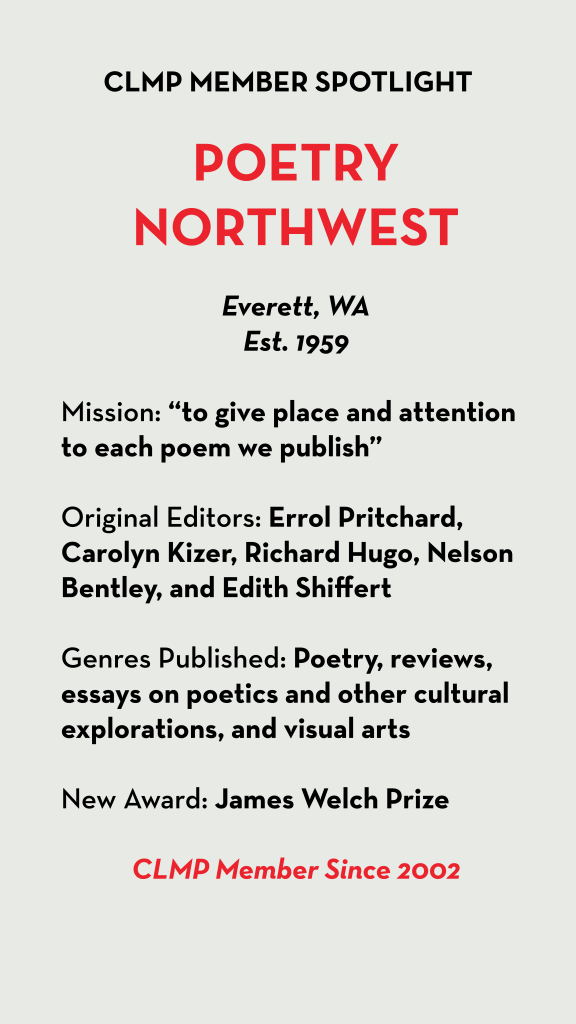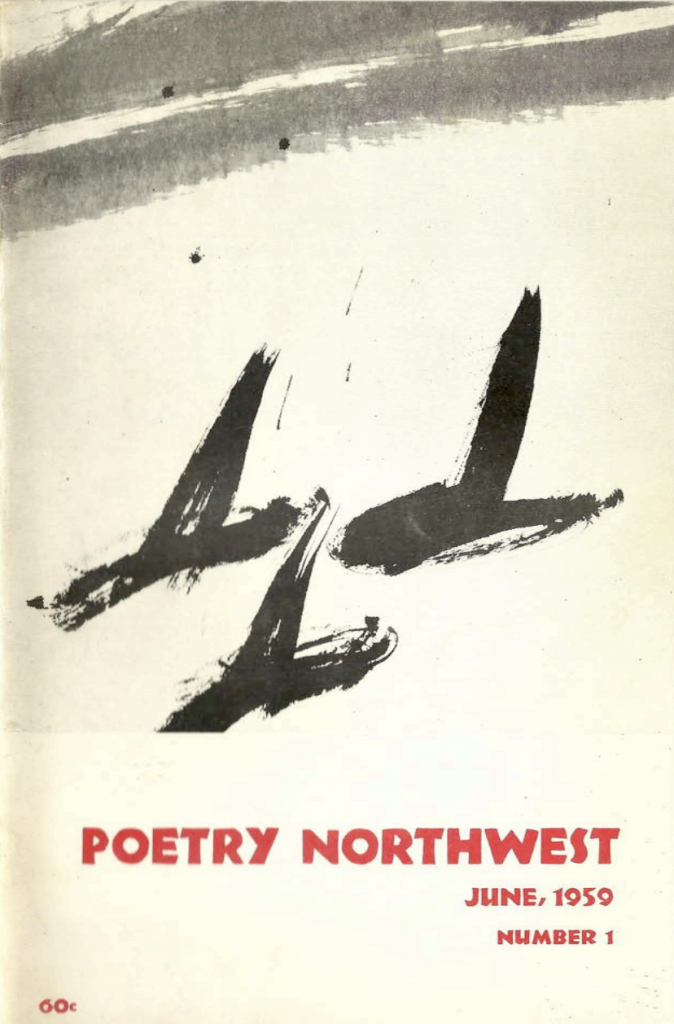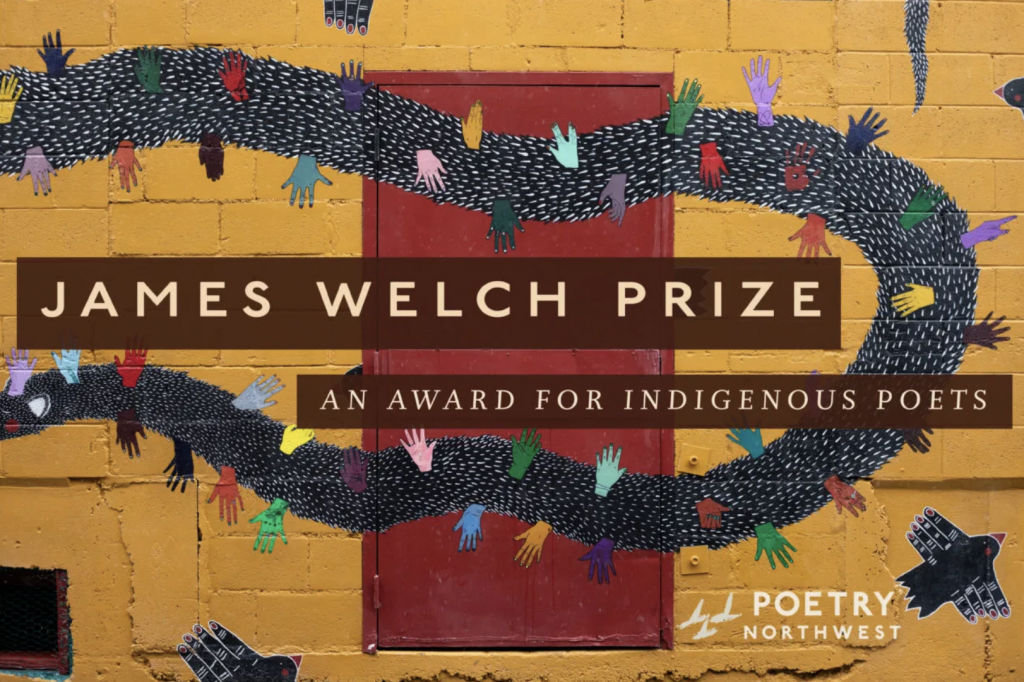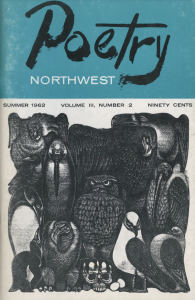We spoke with Keetje Kuipers, editor of Poetry Northwest, in this installment of the CLMP Member Spotlight series.
What is the history behind Poetry Northwest? When was it founded and what was its original mission?
 Poetry Northwest was first established in 1959 and included Carolyn Kizer and Richard Hugo as two of the big-name Northwest poets on the original editorial masthead. In terms of our mission, I think it was Carolyn Kizer who said it best: “We shall continue to encourage the young and the inexperienced, the neglected mature, and the rough major talents and the fragile minor ones.”
Poetry Northwest was first established in 1959 and included Carolyn Kizer and Richard Hugo as two of the big-name Northwest poets on the original editorial masthead. In terms of our mission, I think it was Carolyn Kizer who said it best: “We shall continue to encourage the young and the inexperienced, the neglected mature, and the rough major talents and the fragile minor ones.”
The New Series of Poetry Northwest was established in 2005, and you were brought on as editor in 2020. What are some of your hopes and goals for this new era of Poetry Northwest?
I am increasingly convinced that literary magazines are much more than publications featuring the work of creative writers. Instead, I believe these magazines are the heart and soul of the writing community—and so it stands to reason that community should be at the heart of all our editorial work. The magazines I most admire are those that approach each task—whether that be the behind-the-scenes work of building a staff or the front-of-the-house work of organizing readings and events—as an opportunity to create meaningful conversation and exchange around the literary arts. My hopes and goals for the magazine are based entirely around discovering as many ways as possible to bring readers and writers together for solace, adventure, and joy.
What are some of the rewards and challenges of publishing an entirely poetry-focused literary journal?
 I am delighted by the way that focusing on a single genre allows us to travel down so many deep paths of inquiry. For instance, we recently added a new series called Life List to our web magazine. In this series, Senior Editor Sean Hill invites BIPOC poets to contribute poems about and commentary on birds. Birds! What a wonderfully specific place to put our attention. A multi-genre magazine might not have the space to concentrate on such a small corner of literary discussion. And yet, our first two featured writers in the series, Michael Kleber-Diggs and Jennifer Chang, have already demonstrated what a wide-ranging topic this is. I could have talked about the limitations of a single-genre journal, but each time I wish there was something beyond poetry I could bring to our pages—be it birds or cooking or embroidery—I discover that poetry is there, too.
I am delighted by the way that focusing on a single genre allows us to travel down so many deep paths of inquiry. For instance, we recently added a new series called Life List to our web magazine. In this series, Senior Editor Sean Hill invites BIPOC poets to contribute poems about and commentary on birds. Birds! What a wonderfully specific place to put our attention. A multi-genre magazine might not have the space to concentrate on such a small corner of literary discussion. And yet, our first two featured writers in the series, Michael Kleber-Diggs and Jennifer Chang, have already demonstrated what a wide-ranging topic this is. I could have talked about the limitations of a single-genre journal, but each time I wish there was something beyond poetry I could bring to our pages—be it birds or cooking or embroidery—I discover that poetry is there, too.
Poetry Northwest recently debuted the James Welch Prize, which honors poems written by Indigenous U.S. poets. How did this prize come to be, and why did you choose to specifically celebrate Indigenous poets in this way?
 This prize was something I’d been thinking about for a long time. As the editor of a magazine based in the Northwest, it’s important to me that we engage with all the members of our community, from recent immigrants looking for a new literary gathering place to poets descended from the people who have called this land home for thousands of years. Some of the most thrilling work being written today is coming from the pens of Native writers. I wanted Poetry Northwest to be a part of celebrating the excitement around these voices, and I wanted that celebration to be a chance to give something back. I knew a prize could only accomplish this if it were fee-free and came with more than a significant monetary award. The prize also needed to be a community-building experience, and it needed to be done in partnership with the Indigenous writing community, something that we could not have accomplished without the generosity of Senior Editor and Mvskoke poet Jennifer Foerster. We received nearly 100 entries, from which 10 finalists were chosen by a group of poets from the board of In-Na-Po. Just this week we announced the two inaugural winners of the prize—Kenzie Allen and Brendan Basham—who were picked by guest judge Sherwin Bitsui. They’ll each receive $1,000 and a trip to read with Bitsui in either Seattle, Washington, or Missoula, Montana (the town that was James Welch’s home for many years). Poetry Northwest gets to play host for this contest, but the celebration belongs to the writers who contributed their incredible work.
This prize was something I’d been thinking about for a long time. As the editor of a magazine based in the Northwest, it’s important to me that we engage with all the members of our community, from recent immigrants looking for a new literary gathering place to poets descended from the people who have called this land home for thousands of years. Some of the most thrilling work being written today is coming from the pens of Native writers. I wanted Poetry Northwest to be a part of celebrating the excitement around these voices, and I wanted that celebration to be a chance to give something back. I knew a prize could only accomplish this if it were fee-free and came with more than a significant monetary award. The prize also needed to be a community-building experience, and it needed to be done in partnership with the Indigenous writing community, something that we could not have accomplished without the generosity of Senior Editor and Mvskoke poet Jennifer Foerster. We received nearly 100 entries, from which 10 finalists were chosen by a group of poets from the board of In-Na-Po. Just this week we announced the two inaugural winners of the prize—Kenzie Allen and Brendan Basham—who were picked by guest judge Sherwin Bitsui. They’ll each receive $1,000 and a trip to read with Bitsui in either Seattle, Washington, or Missoula, Montana (the town that was James Welch’s home for many years). Poetry Northwest gets to play host for this contest, but the celebration belongs to the writers who contributed their incredible work.
Your website announces Poetry Northwest’s intention to compile and publish an Anti-Racism Annual Report. What will this report consist of, and can you recommend resources for other literary journals and presses hoping to do the same?
 I really came into the poetry scene not long before VIDA was created. Their annual “count,” which surveys the top literary magazines for gender parity in the publishing and coverage of women-identified writers, helped to guide my earliest thinking about the role of magazines in the literary community. As much as I appreciate VIDA’s work, I’m also frustrated that it’s something an outside organization has had to put their time and energy into. If, as I believe, a literary magazine should be a community-minded organization built on a foundation of genuine devotion to the artists we’re meant to serve, then we should be running our own “counts” and sharing the results with our readers. Of course, there’s a lot more to it than simple numbers. It’s not enough to set a publication goal (ours is to have at least 50% of the work in each issue of our magazine be authored by writers of color). It also means reinventing the systems of power at every level of our publication. The only way to accomplish this is by making our goals transparent and holding ourselves accountable for reaching them. Our Anti-Racism Annual Report is a list of our anti-racist goals for the previous year, a detailed account of what we did and didn’t accomplish, and a set of new goals for the coming year. This is not something we’re going to ace. But as Crystal Williams has pointed out, it’s not about getting it right immediately out of the gate. It’s about endurance and long-term commitment. The only resources any magazine needs to accomplish that is the willingness to do a long-haul gut check.
I really came into the poetry scene not long before VIDA was created. Their annual “count,” which surveys the top literary magazines for gender parity in the publishing and coverage of women-identified writers, helped to guide my earliest thinking about the role of magazines in the literary community. As much as I appreciate VIDA’s work, I’m also frustrated that it’s something an outside organization has had to put their time and energy into. If, as I believe, a literary magazine should be a community-minded organization built on a foundation of genuine devotion to the artists we’re meant to serve, then we should be running our own “counts” and sharing the results with our readers. Of course, there’s a lot more to it than simple numbers. It’s not enough to set a publication goal (ours is to have at least 50% of the work in each issue of our magazine be authored by writers of color). It also means reinventing the systems of power at every level of our publication. The only way to accomplish this is by making our goals transparent and holding ourselves accountable for reaching them. Our Anti-Racism Annual Report is a list of our anti-racist goals for the previous year, a detailed account of what we did and didn’t accomplish, and a set of new goals for the coming year. This is not something we’re going to ace. But as Crystal Williams has pointed out, it’s not about getting it right immediately out of the gate. It’s about endurance and long-term commitment. The only resources any magazine needs to accomplish that is the willingness to do a long-haul gut check.
